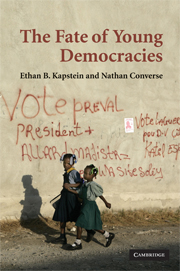Book contents
- Frontmatter
- Contents
- List of Figures and Tables
- Preface and Acknowledgments
- 1 What Makes Young Democracies Different?
- 2 Why Do Young Democracies Fail?
- 3 Are Some Regions More Democracy Friendly?
- 4 Is Democracy Promotion Effective?
- 5 Conclusions and Policy Recommendations
- Appendix 1 Methodology
- Appendix 2 List of Young Democracies
- References
- Index
2 - Why Do Young Democracies Fail?
Published online by Cambridge University Press: 05 June 2012
- Frontmatter
- Contents
- List of Figures and Tables
- Preface and Acknowledgments
- 1 What Makes Young Democracies Different?
- 2 Why Do Young Democracies Fail?
- 3 Are Some Regions More Democracy Friendly?
- 4 Is Democracy Promotion Effective?
- 5 Conclusions and Policy Recommendations
- Appendix 1 Methodology
- Appendix 2 List of Young Democracies
- References
- Index
Summary
New democracies are, in effect, in a catch-22 situation: lacking legitimacy they cannot become effective; lacking effectiveness they cannot develop legitimacy.
Samuel P. Huntington (1991, 258)IN THIS CHAPTER WE EXPLORE THE FACTORS THAT SEEM TO increase the risk that a young democracy will be overthrown. The first section of the chapter opens by presenting descriptive statistics comparing failed democracies to those that have endured through 2004, the end of our sample period. Although more recent cases of democratic reversal, such as Thailand, Fiji, and Russia, are not included in our data set, we discuss them here and in other chapters. We then go on to make use of hazard model regressions to ascertain which of the many variables we highlight in this overview are most strongly associated with the reversal of democracy.
We note that although much of the earlier academic work that relates institutions, economic performance, and democratic survival (which we review later) has sought to discern causal connections between such broad variables as “democracy” on the one hand and “growth” on the other, our specific purpose here is to present a more nuanced account of the relationships between democratic institutions and a number of policy variables and outcomes. This is essential because some of the more aggregate-level work may lead us, like the fabled drunk, to search for the key to understanding democratic survival under the lamppost even if we need to look elsewhere.
- Type
- Chapter
- Information
- The Fate of Young Democracies , pp. 37 - 70Publisher: Cambridge University PressPrint publication year: 2008



